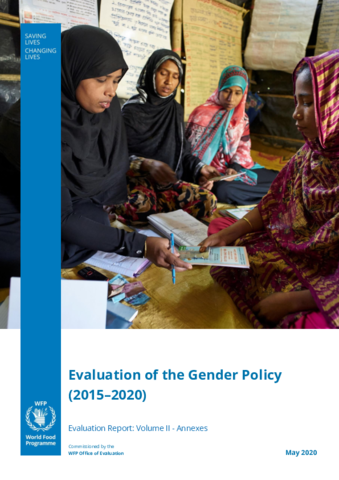
The Gender Policy (2015-2020) was approved in May 2015. The evaluation provides evidence, analysis and recommendations related to the Gender Policy’s quality, results and to the factors that influenced those results.
It covers the period from 2015 to 2019 and addresses three standard policy evaluation questions:
- How good is the policy?
- What were the results of the policy?
- Why has the policy produced the results that have been observed?
The evaluation concluded that:
- The Gender Policy remains relevant to WFP’s commitments to Agenda 2030, the SDGs and UN Reform but requires an update to support WFP’s work at the country level within UN system efforts to accelerate the support provided to partners as part of the Decade for Action 2020-2030.
- WFP has shown leadership in establishing frameworks to supports its work toward GEWE. However, the strong leadership focus on efforts to address gender parity have tended to overshadow other aspects of the Gender Policy and present a barrier to strengthening WFP’s overall approach to gender equality and women’s empowerment.
- WFP is missing opportunities to ground the design of programmes around a comprehensive contextual analysis of the needs and interests of women, men, girls and boys. Consequently, country offices often struggle to translate GEWE concepts into clear actions tailored to each of their CSP strategic outcomes.
- Overall, WFP has strengthened the enabling environment for gender equality and women’s empowerment. However, attention to GEWE is variable and reliant on the individual decision-making of regional and country directors to lead gender mainstreaming.
- Finally, the evaluation found that the limited financial investment made to operationalize the Gender Policy across HQ, Regional Bureaux and Country Offices weakened the organization’s ability to ensure that GEWE becomes integral to the culture and learning of the organization.

